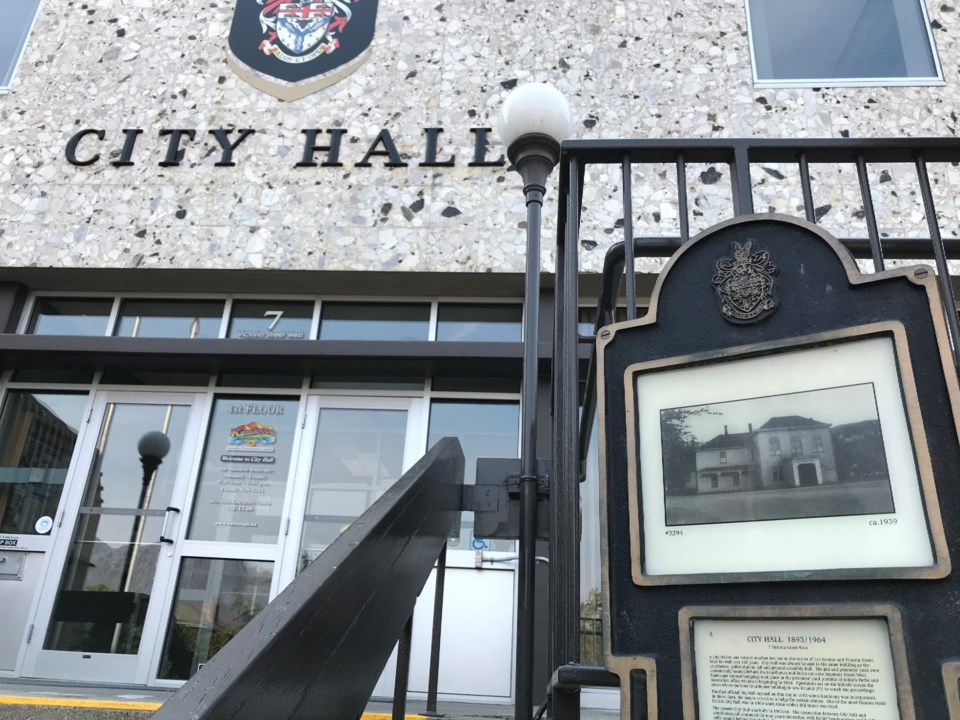Kamloops city council has approved the first three readings of a bylaw amendment looking to ban open drug use on sidewalks and within 100 metres of public spaces like parks and playgrounds.
Kamloops is one of several municipalities moving to prohibit drug use in public spaces after decriminalization took effect in B.C. earlier this year. The pilot policy allows adults to carry up to 2.5 grams of drugs including heroin, fentanyl, cocaine and methamphetamines.
Coun. Katie Neustaeter, who tabled the motion directing staff to prepare the bylaw amendments, said Tuesday she did so knowing the city’s actions would help put pressure on the province and force next steps.
“Some things are worth challenging — and this is one of those things,” Neustaeter said.
“I am comforted to see this council willing to challenge, and willing to step up to the mandate, which is supporting the lives of those who are currently caught in the trap of addiction and also making sure that it doesn't unduly affect our community around us.”
In response to concerns coming from a number of communities, Premier David Eby has said he will work with local governments to identify issues and put rules in place ensuring safer communities.
Will Beatty, the city’s acting community services manager, told council the bylaw amendments will prohibit the display or use of a controlled substance on any sidewalk or within 100 meters of a designated area. These areas include public parks, playgrounds, beaches, pools, community centres, recreation centres, libraries and arenas.
Beatty said the bylaw won’t apply to supervised consumption or overdose provision sites operated by Interior Health or government authority.
“This allows for the consumption at supervised consumption sites that are located within 100 metres of the designated areas,” Beatty said.
“Contraventions of the bylaw allow for relocation to comply with the bylaw by CSOs or police, and can also result in a fine.”
The city manager said CSOs will first seek to speak with people using drugs about the location of supervised consumption sites, calling on resources like the Envision shuttle to help transport individuals to these places.
Coun. Nancy Bepple said she was concerned if it's adopted, the bylaw will force unhoused people into unsafe situations. She noted the 2021 point in time homeless count found 86 per cent of unhoused people in Kamloops used substances.
She said there is a lack of supervised consumption sites for people who smoke drugs.
“I can’t accept we take this approach that every place in Kamloops that’s public is going to be banned. We will be forcing people into dark alleys and washrooms in places where they will still use, but they will be unsafe,” Bepple said.
Mayor Reid Hamer-Jackson said he agreed with Bepple in some ways, which is why he had council take another look at Neustaeter’s motion a few months ago. He said he believes it’s important to work with Interior Health, especially as the overdose crisis is still classified as a public health emergency.
Coun. Mike O’Reilly said he believes the provincial government has “put the cart before the horse,” decriminalizing drugs while not providing enough supervised consumption sites or sufficiently funding mental health services.
“The fact that they can’t do those things and live up to their expectations, we’re the ones dealing with the outfall of that as a community,” he said. “We’re here to say, there’s certain places we just cannot have this happen. It’s not our place to come up with safe consumption or inhalation — that is beyond us.”
Coun. Bill Sarai applauded Neustaeter for bringing the motion forward.
“We were going a little bit softer earlier, saying we don’t want to really push back, it’s going to go to the courts. I’m saying hell, let’s get it to the courts,” Sarai said. “The more we push back, the more attention I hope the government gets that what they are doing is not working.”
Council voted 8-1 in favour of approving the first three readings of the bylaw, with Bepple the only vote opposed. The bylaw will come forward for final adoption at a future council meeting.



